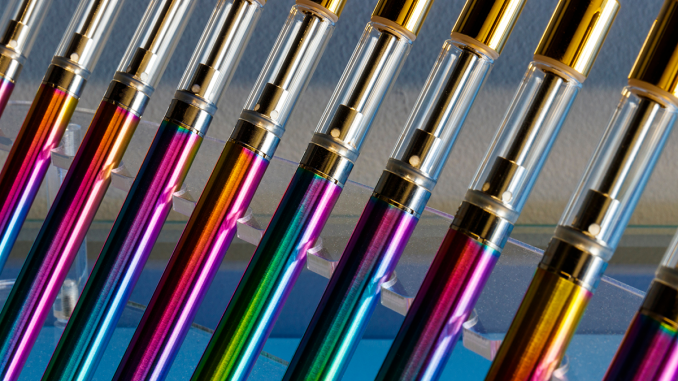
[ad_1]
One of CBD’s overarching functions in the body is to support homeostasis, and for years scientists have investigated its potential at treating a wide variety of addictions. In a way, addiction may be seen as a lack of balance: a series of highs and lows or peaks and valleys, with little middle ground.1
How, exactly, CBD may smooth this out on the molecular level remains a subject of considerable interest in preclinical research, especially considering that CBD works both within and well beyond the “classic” endocannabinoid system.23 However it happens, a growing body of literature – primarily in animal models, but increasingly in humans – confirms CBD does indeed have efficacy in helping to treat addiction to a variety of substances, including, ironically enough, problematic cannabis use.4
While this may sound strange on its face, the fact is that most cannabis products sold in licensed dispensaries and on the street are high in THC and low in CBD. Since CBD is thought to alter both THC activity5 and broader addiction-related pathways6 by interacting indirectly via the CB1 cannabinoid receptor, it follows that introducing significantly more CBD would temper not only the cannabis high, but also, for some individuals, the pleasure-craving cycle.
Indeed, two recently published papers add to the evidence that increasing CBD intake may help cannabis users experiencing dependence.

Vape More CBD, Smoke Fewer Joints
A May 2022 article in the journal Frontiers in Psychiatry7 describes how a team of French researchers recruited 20 heavy cannabis users who were actively seeking help to reduce or stop their consumption through a community addiction facility in late 2020. At baseline, participants were smoking a mean of 6.7 joints per day, in many cases with added hash or resin for even higher potency.
The researchers wanted to know if CBD could help them cut back on their high-THC cannabis use. Participants were provided electronic cigarettes and an unlimited supply of vape liquid produced by a company called Leaf. The vape liquid contained CBD and, since they were also smokers, nicotine if they liked, which all did. (“Obtaining a liquid with nicotine was recommended in case of tobacco consumption to limit the risk of increased cigarette consumption or signs of tobacco withdrawal,” the authors write.) Participants were asked to report back about their cannabis consumption, vape liquid consumption, cigarette consumption, and experience of cravings or withdrawal.
All 20 participants started off with a CBD concentration in the vape liquid of 33.3 mg/mL. At subsequent weekly visits, this could be adjusted upward to 66.6 mg/mL or 100 mg/mL based on cravings and withdrawal symptoms (with nicotine levels held constant).
Interestingly, by week four of the trial, the six participants who reduced their joint tally by more than 50% were also consuming the most CBD: 221 mg per day compared to 66 mg per day. This difference subsequently disappeared and only nine participants completed the full 12-week follow-up, but six of them at least halved their cannabis consumption by the study’s end, and three stopped using entirely. The mean number of daily joints among them was down to three.
Cigarette use, likewise, dropped from a mean of seven to less than three, with two individuals quitting altogether. Given that CBD has been shown to reduce cigarette consumption,8 this effect could be attributable to the vaped CBD, the nicotine replacement, or both – there’s no way to know for sure. In any case, no side effects or withdrawal symptoms requiring further treatment were reported.
The authors acknowledge that given its observational nature, uncontrolled design, and other limitations, the study cannot offer conclusive evidence on the efficacy of inhaled CBD for treating cannabis dependence. But the research at least points to a low-risk option for those looking to cut back.

Pharmaceutical Cannabinoids for Cannabis Dependence
Another recent paper, published in June in the same journal9 offers a systematic review of previous randomized controlled trials that evaluated the therapeutic potential of various cannabinoids in treating cannabis dependence and withdrawal. In addition to pure CBD, the Switzerland- and Germany-based authors also looked at studies evaluating the THC-based pharmaceuticals dronabinol and nabilone and the drug nabiximols, which contains CBD and THC in nearly equal measure.
THC-based pharmaceuticals dronabinol and nabilone showed “limited or no therapeutic potential” in treating cannabis dependence.
Among seven trials with a total of 597 participants that qualified for the review, two tested dronabinol, one tested nabilone, three tested nabiximols, and one tested CBD isolate. The authors’ findings? Across the board, the THC-based pharmaceuticals dronabinol and nabilone showed “limited or no therapeutic potential” in treating cannabis addiction. (Perhaps not a surprise, as substituting pure synthetic THC for THC-rich flower was always a suspect treatment scheme.)
But pure CBD and nabiximols both “demonstrated broader efficacy.” CBD alone was most effective (at doses of doses of 400 mg and 800 mg per day, but not 200 mg per day), significantly reducing high-THC cannabis use and improving abstinence while reducing withdrawal symptoms. Nabiximols (containing CBD doses of either 80mg/day or 105 mg/day, depending on the trial) was slightly less effective, but still reduced use, improved abstinence, and reduced withdrawal symptoms and craving.
“However, the evidence is at this time too weak to support any specific medication,” the authors caution. “Future studies should include greater sample sizes, more diverse populations, longer treatment periods, and head-to-head comparisons.”
Particularly interesting would be a showdown between CBD isolate and nabiximols for treating other substance addictions. Given the latter’s balanced 1:1 THC:CBD content, it might provide additional synergistic relief in some cases without feeding new dependencies.
Nate Seltenrich, an independent science journalist based in the San Francisco Bay Area, covers a wide range of subjects including environmental health, neuroscience, and pharmacology.
Copyright, Project CBD. May not be reprinted without permission.
Footnotes
[ad_2]
Source link

Soyez le premier à commenter